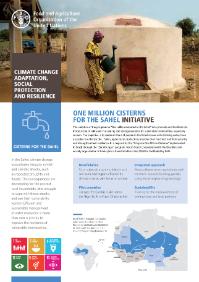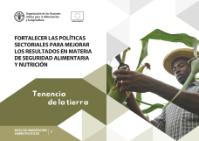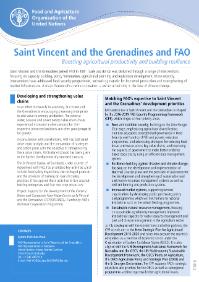Focal point
Location
The Food and Agriculture Organization of the United Nations leads international efforts to defeat hunger. Serving both developed and developing countries, FAO acts as a neutral forum where all nations meet as equals to negotiate agreements and debate policy. FAO is also a source of knowledge and information. We help developing countries and countries in transition modernize and improve agriculture, forestry and fisheries practices and ensure good nutrition for all. Since our founding in 1945, we have focused special attention on developing rural areas, home to 70 percent of the world's poor and hungry people.
Members:
Resources
Displaying 336 - 340 of 5073One million cisterns for the Sahel initiative
This brochure highlights the objectives and key information of the FAO project entitled “One million cisterns for the Sahel”. It aims to illustrate the project activities’ expected positive impacts in terms of food security, agricultural activities and nutrition among beneficiairies. The objective is to inform FAO partners and donors on this innovative initiative aiming to introduce rainwater harvesting and storage systems at the community level.
Forests and Water: managing our connected natural capital
The forest-water nexus is crucial for ensuring water and food security, as well as for achieving sustainable development objectives. Only by recognising the interlinkages of forests and water, and how the management of these resources influences productive multi-functional landscapes can appropriate long-term benefits from landscape planning and management be actualized. And while it is important that generalized assumptions about the forest-water nexus are not widely applied due to their complex and context specific nature, the knowledge is available to lend guidance.
Fortalecer Las Políticas Sectoriales Para Mejorar Los Resultados En Materia De Seguridad Alimentaria Y Nutrición
La tierra, la pesca, los bosques y otros recursos naturales proporcionan una base para los medios de vida y las prácticas sociales, culturales y religiosas. Sin embargo, la mayoría de las personas en las zonas rurales de los países en desarrollo no tienen ningún tipo de documentación para proteger sus tierras y sus derechos a los recursos naturales, lo que pone en peligro sus medios de subsistencia y, en consecuencia, su seguridad alimentaria y nutricional.
Saint Vincent and the Grenadines and FAO
Saint Vincent and the Grenadines joined FAO in 1981. Early assistance was delivered through a range of interventions focusing on capacity building, policy formulation, agricultural planning and legislation development. More recently, interventions have addressed food security programmes, technology transfer for improved production and strengthening of market infrastructure. A major feature of current cooperation is resilience building in the face of climate change.
FAO and Traditional Knowledge: The Linkages with Sustainability, Food Security and Climate Change Impacts
In developed and developing countries all over the world, farmers and indigenous and local communities have traditional knowledge, expertise, skills and practices related to food security and to food and agricultural production and diversity. Since its creation in 1945, FAO has recognized the significant contributions these make to food and agriculture, and the relevance of on-farm/in situ and ex situ conservation of genetic resources for food and agriculture.











